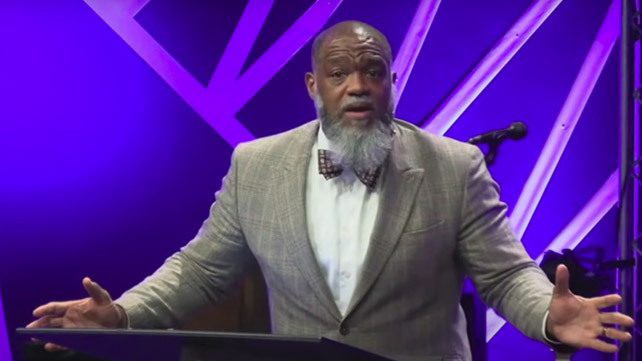Note: This story was updated Friday night, March 4, to include newly available comments from Voddie Baucham.
With the surprise announcement by Southern Baptist Convention President Ed Litton that he will not seek a traditional second term, speculation has quickly turned to who will run for the leadership post within a deeply fractured denomination.
Less than 24 hours after Litton’s announcement, a pastor quite similar to Litton in many ways announced his candidacy. Willy Rice, pastor of Calvary Church in Clearwater, Fla., said he will run for the post.
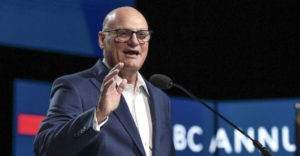
Willy Rice preaching the convention sermon at the SBC annual meeting (Baptist Press)
Rice currently serves as a trustee of the North American Mission Board, is a past president of the Florida Baptist Convention, served as president of the SBC Pastors’ Conference in 2015, chaired the 2010 SBC Committee on Committees and chaired the 2016 SBC Committee on Nominations. He delivered the convention sermon at last summer’s SBC Annual Meeting where Litton was elected. In that sermon Rice said Southern Baptists can sometimes be “jerks” by opposing the right things in the wrong way.
Rice is positioned as a convention loyalist and traditionalist who will seek institutional peace amid the convention’s own internecine war, largely between traditionalists and a right flank that believes the SBC has fallen into liberalism and “wokeness.”
Chief among those vocal critics is the Conservative Baptist Network, a highly organized group of right-leaning Southern Baptist pastors, leaders and laypeople. Sources close to the network have indicated that one of the likely candidates to oppose Rice in the presidential election is Voddie Baucham Jr., dean of the School of Divinity at African Christian University in Lusaka, Zambia. Baucham’s name also was floating across social media March 3 as a likely candidate. And just a few weeks ago, on Jan. 10, Baucham suddenly was added to CBN’s Steering Council.
Eligibility to run
After BNG broke the news of Baucham’s likely nomination, a conservative website published an interview with him where he confirmed he has, indeed, been asked to run for the office but isn’t sure he’s eligible.
“I have indeed been asked to accept a nomination for SBC president. While I am honored to have been asked, I am not sure I am eligible,” Baucham told The Christian Post. “There are questions about the way church membership is considered for missionaries.”
In the published interview, Baucham doesn’t rule out running for the post; he merely explains there are questions about his eligibility. And even that is complicated by his own views of the church and church membership.
Baucham confirmed he has, indeed, been asked to run for the office but isn’t sure he’s eligible.
The SBC’s Constitution requires all officers to be “members of Baptist churches cooperating with this convention.” The same document also envisions the SBC as being organized “for Baptists in the United States and its territories.” Although the convention has sent missionaries around the globe for a century and a half, those missionaries often maintain memberhip in home churches or supporting churches in the United States.
Baucham explained why that’s a problem for him: “My sending church (the church I planted) has always practiced regenerate, resident church membership. Unfortunately, this is not common practice in many SBC churches. As such, we have always believed that missionaries sent to the field needed to join local churches in order to be shepherded properly.”
In layman’s terms, Baucham philosophically opposes what many SBC churches call “non-resident membership,” a common category for those who want to retain affiliation with a church but do not currently live in the geographical proximity of the church. This notion has been further challenged over the past two years as many churches have welcomed online members who live all over the world and are by definition “non-resident.”
Baucham said he believes non-resident membership is “unbiblical.” He did not explain the details of his conviction, but the historic opposition to non-resident membership is rooted in an early 20th century movement known as Landmarkism.
The SBC never has had a foreign missionary serve as president of the convention, so this technicality has not been tested. Baucham said this is a “huge problem in foreign missions.”
Why Baucham would be a contentious candidate
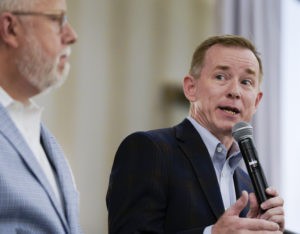
Mike Stone speaks during an event at the SBC annual meeting in June 2021, while Ed Litton looks on. Litton defeated Stone in a run-off election for SBC president. (Baptist Press)
Other candidates also are likely to run, as last year’s presidential race began as a four-way contest. The runoff was between Litton and Mike Stone, a Georgia pastor who was heavily backed and promoted by CBN. Litton won with a slim margin of 556 votes.
If Baucham runs, he could easily be the most controversial candidate on the ticket and the candidate with the least ties to the SBC.
Baucham is former teaching pastor at Grace Family Baptist Church in Houston, where one of his closest coworkers who succeeded him as pastor, Stephen Bratton, later was convicted on multiple counts of child sexual abuse and is now serving a 17-year prison sentence for repeatedly raping a female family member who was a minor.
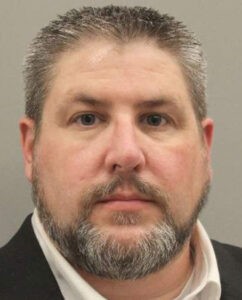
Stephen Bratton
The abuse occurred from 2013 to 2018, which overlaps a two-year period from 2013 to 2015 in which Baucham and Bratton worked together at the Houston church. Other sources have detailed the reportedly close relationship between the two pastors. Documented aspects of their ministry relationship include the following: both of them co-signing the anti-social justice Dallas Statement, Bratton posting from Baucham’s Facebook page, and Bratton being recognized in the acknowledgments section of Baucham’s book, Expository Apologetics.
While other co-pastors at the church not only cooperated with the police investigation but actually reported Bratton to police when he confessed to them, there appears to be no public statement by Baucham on the matter.
Baucham also is the author of a controversial 2021 book titled Fault Lines: The Social Justice Movement and Evangelicalism’s Looming Catastrophe.
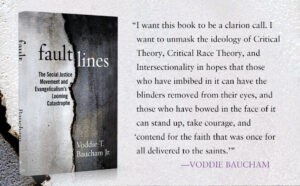 Writing as a Black pastor, Baucham bucks the majority view of Black pastors inside and outside the SBC by warning against teaching of Critical Race Theory, intersectionality and compromise on biblical truth in favor of social justice. Similar warnings have been primarily issued by white evangelical Christians, sparking a new salvo in America’s culture wars.
Writing as a Black pastor, Baucham bucks the majority view of Black pastors inside and outside the SBC by warning against teaching of Critical Race Theory, intersectionality and compromise on biblical truth in favor of social justice. Similar warnings have been primarily issued by white evangelical Christians, sparking a new salvo in America’s culture wars.
When the presidents of the six SBC seminaries issued a declaration against Critical Race Theory, that set off an exodus of Black congregations from the SBC and an intense fight at last year’s annual meeting about a formal resolution on Critical Race Theory. Many Black pastors and church members, as well as those outside white evangelical circles, view the Critical Race Theory debate as a manufactured political maneuver rooted in institutional racism, not a legitimate problem.
But Baucham appears to be all in on the crusade against Critical Race Theory, and he has gained a hearing among white evangelicals because he is a Black pastor who agrees with their viewpoints.
Accusations of misquoting and plagiarism
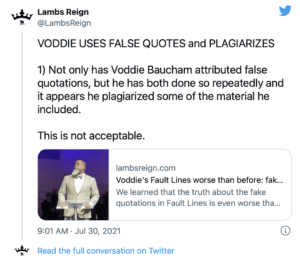 Aside from the racial issue, Baucham has been accused by conservative author Joel McDurmon of plagiarizing and falsely attributing quotations to Critical Race Theory scholar Richard Delgado. Baucham and his publisher have denied these accusations.
Aside from the racial issue, Baucham has been accused by conservative author Joel McDurmon of plagiarizing and falsely attributing quotations to Critical Race Theory scholar Richard Delgado. Baucham and his publisher have denied these accusations.
According to McDurmon, one particularly problematic passage involves Baucham accusing Delgado of asserting that “whites are incapable of righteous action on race.” This false quotation is nowhere in Delgado’s work. But this attribution was mistakenly made not only in the book, but also attributed to Delgado by Baucham in a sermon. McDurmon has called this “a lie and distortion of CRT.”
In an interview with Faithfully Magazine, Delgado said Baucham “was confusing me with someone else or just making things up, either of which is a bad idea when you are writing for an audience that values integrity and truth-telling.”
Endorsements and opposition
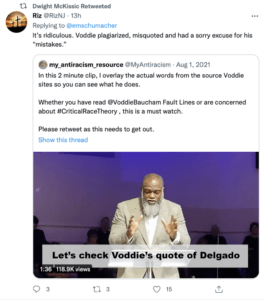 Prior to his pastoral tenure at Grace Family Church, Baucham previously served on staff at Cornerstone Baptist Church in Arlington, Texas, where vocal Black SBC pastor Dwight McKissic is pastor. McKissic appears not to be a Baucham fan. On March 3, he retweeted a link to the problematic Baucham sermon that said: “It’s ridiculous. Voddie plagiarized, misquoted and had a sorry excuse for his ‘mistakes.’”
Prior to his pastoral tenure at Grace Family Church, Baucham previously served on staff at Cornerstone Baptist Church in Arlington, Texas, where vocal Black SBC pastor Dwight McKissic is pastor. McKissic appears not to be a Baucham fan. On March 3, he retweeted a link to the problematic Baucham sermon that said: “It’s ridiculous. Voddie plagiarized, misquoted and had a sorry excuse for his ‘mistakes.’”
Most of Baucham’s support from within the SBC comes from its far-right flank and specifically from those who embrace an extreme form of complementarianism, the teaching that God created men and women differently to perform different roles in society.
Endorsements of Baucham’s book came mainly from complementarians and people associated with the Council on Biblical Manhood and Womanhood. Baucham also has been influential in homeschool and “stay-at-home daughter” movements. In a trailer from 2011, Baucham promoted a film that profiled seven young adult women who chose to stay in their parents’ homes to honor the authority of their fathers until they passed authority to their future husbands.
The current context
Amid this year’s turmoil in the SBC related to an independent investigation into alleged mishandling of sexual abuse allegations by the SBC Executive Committee, former Executive Committee President Ronnie Floyd resigned abruptly last fall, and a few weeks ago Willie McLaurin was named interim president, making him the first Black person to serve as head of any SBC entity.
At the same time, the current chairman of Executive Committee trustees is a Black man, Pastor Rolland Slade of California.
The SBC has had only one Black president in its history, Fred Luter, who served from 2012 to 2014.
Baptist News Global has reached out to Baucham for comment, but he has not responded.
Related articles:
SBC President Ed Litton will not seek second term
Could newly elected SBC president be forced to resign over sermon plagiarism?
Litton and McLaurin urge SBC Executive Committee toward compassion and Christlikeness
The white evangelical war on truth | Opinion by Joel Bowman Sr.
American Gospel: Christ Crucified is stuck in a time warp | Analysis by Rick Pidcock

